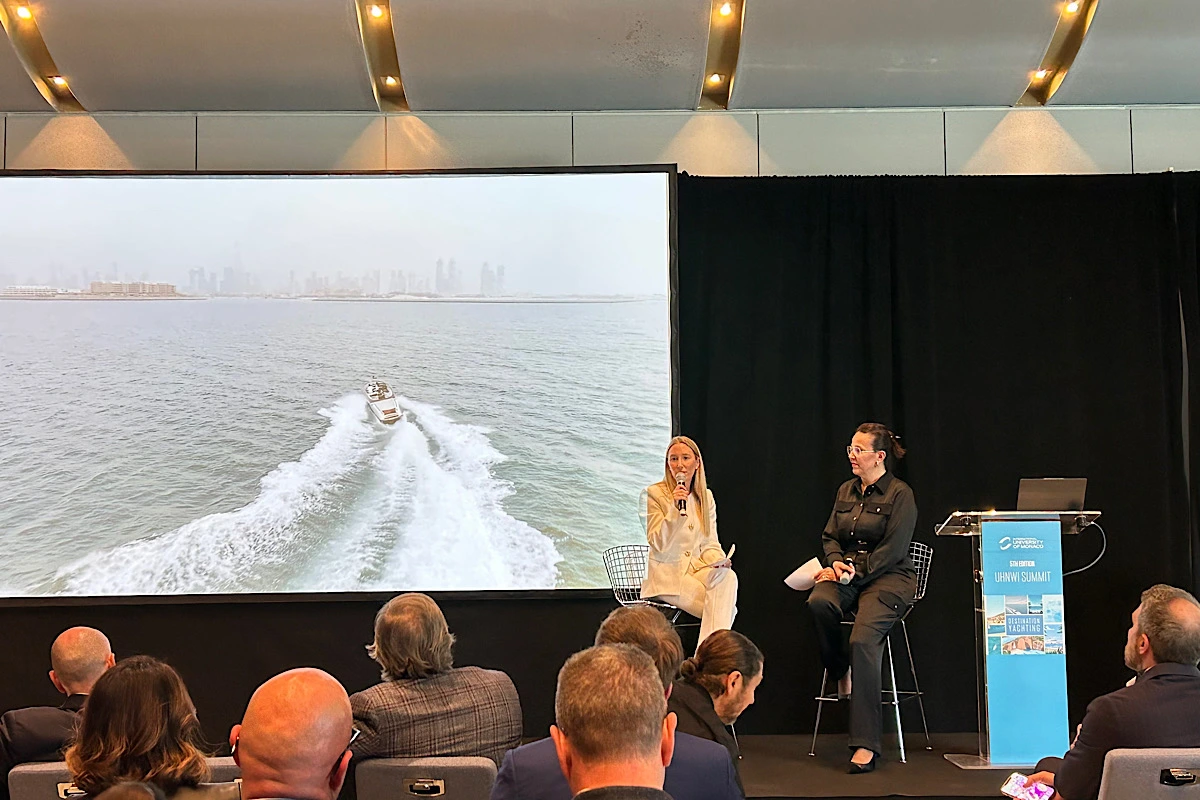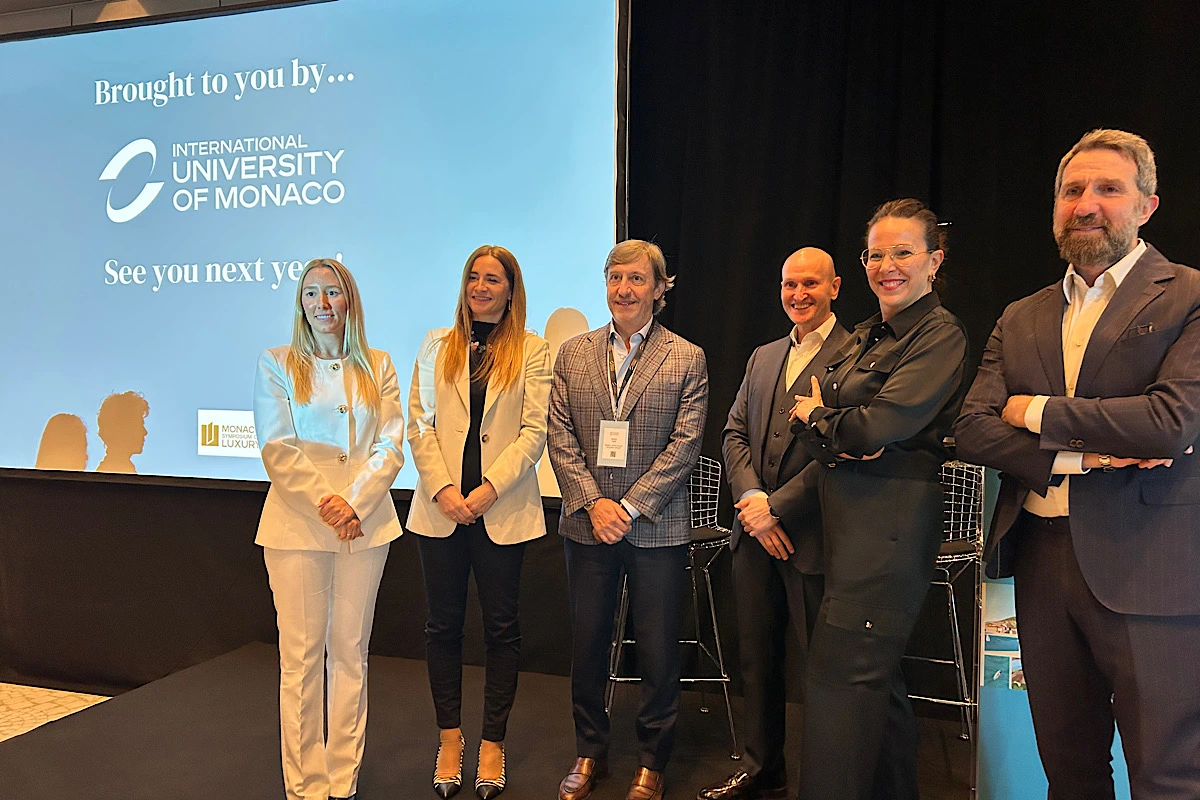Amid the discussions on AI and sustainability, the most intriguing conversations at the 2025 UHNWI Insight Summit in Monaco on 2nd April were about the deeply more romantic notions of barefoot elegance and “slow” yachting. Monaco Life went along to the event, which was part of the Monaco Symposium on Luxury, to learn more about how high-tech advances, coupled with a desire to retreat to more humble origins, are shaping the future of luxury travel for the next generation of the world’s wealthiest.
Organised by the International University of Monaco (IUM) on 2nd April as part of the Monaco Symposium on Luxury, the 2025 Ultra High Net Worth Individual (UHNWI) Insight Summit brought together leading figures in luxury design, tourism strategy and innovation for an afternoon of forward-thinking discussion at Le Méridien Beach Plaza.
Monaco Life was there as academics, architects, and industry executives explored how the next wave of wealth is reshaping the yachting and hospitality landscape. The theme of the session, Experiential Tourism and Experiential Yachting – Designing Unique Strategies in Luxury Destination Management, set the tone for what followed: a series of case studies, predictions, and calls to action centred on evolving lifestyles, environmental imperatives and the concept of luxury as experience rather than excess.
Designing for a new era of wealth
Nicola Colella, General Director of Luca Dini Design & Architecture, opened the summit by challenging participants to rethink the very foundation of destination planning.
“When you arrive at a destination by sea, you have a completely different perspective on the environment,” he said, introducing the idea that marinas can no longer be seen as transitional spaces but as integral parts of the destination itself.
As part of his presentation, Colella introduced the concept ‘Think 2033’, forecasting a new generation of UHNWIs: younger, more ethnically and culturally diverse, and more focused on lifestyle than asset accumulation.
“They will invest in travel, technology, outdoor living, and sport, not real estate,” he said. “We must design for people who value barefoot elegance, authenticity, and personalisation. It’s no longer about brands—it’s about experience.”
See more: Monaco Symposium on Luxury returns with focus on AI and sustainability
From Sindalah Island in NEOM—one of the first major hospitality projects in Saudi Arabia’s futuristic city—to Krorez in Albania and Dubai, Colella shared examples of how his firm is applying these principles on the ground.
“What we try to replicate in this project is an experience that countries like this haven’t seen before but is typical in the Mediterranean,” he said of Sindalah, which features 70 berths and three five-star hotels.
His team is also working to move beyond the outdated concept of marinas as static “parking lots for yachts”. Instead, he said, they should be reimagined as vibrant, interconnected hubs, blending sea and land, public and private, architecture and nature.
“Luxury today is fluid. Spaces should reflect that,” summarised Colella.
Slow yachting: a new mindset
Picking up on this theme of deeper, more intentional experiences, the IUM’s Analissa Tarquini, Director of MSc in Luxury Management, and Phil Klaus, Professor of Customer Experience Strategy and Management, introduced the concept of slow yachting—an extension of the slow tourism movement rooted in sustainability, mindfulness and cultural immersion.
“Slow tourism is about luxurious tranquility,” said Tarquini. “It makes you feel in control, connected and at ease. It leads to environmental symbiosis and more meaningful discovery.”
Linking their ideas back to Colella’s design philosophy, the IUM team proposed a Slow Yachting label that would reward marinas and destinations embracing these values. The movement, they argued, could help reposition yachting in the public eye—away from exclusivity and toward environmental and social responsibility.
Their managerial recommendations ranged from training crews in mindfulness and guest engagement to investing in green tech and collaborating with local artisans.
“Move yachting from leisure into transformative experiences,” urged Klaus.
Real-world applications
Meritxell Gonzalez, Director of Marina & Retail at Bulgari Resort Dubai, also demonstrated how these values are already being translated into branded environments. Located on Jumeira Bay Island, the marina offers 46 berths for yachts up to 40 metres and is directly connected to the resort’s amenities.
“It’s the first branded marina of its kind,” said Gonzalez, describing how the concept merges hospitality and yachting into a single, curated experience.
Designed in the style of a Mediterranean village, the marina offers access to fine dining, a yacht club, luxury boutiques and spa services, positioning it as both a mooring point and a lifestyle destination.

Marina Port Vell Barcelona, meanwhile, was presented as a key player in the global yachting calendar. It will soon serve as the official superyacht marina for the 37th America’s Cup and a hub of luxury during the event.
Stefano Tositti, CEO of Acquera Group, closed the session with a focus on how artificial intelligence is being used to streamline and personalise the yachting experience. He presented Acquera’s integration of AI technology into WhatsApp, which allows guests and crew to access concierge services, make reservations and receive tailored recommendations through a familiar, real-time messaging platform.
“Artificial intelligence is not replacing luxury—it’s refining it,” said Tositti, positioning the tool as a practical solution to enhance efficiency and elevate guest service without compromising on discretion or exclusivity.
Across disciplines—from architecture to AI and academia to operations—the speakers were united in one message: the next generation of UHNWIs will demand more than premium services. They will seek experiences that are meaningful, fluid and in tune with the environment and the people they encounter.
Read related:
World Yachting Summit to unite global industry leaders in Monaco
Monaco Life is produced by a team of real multi-media journalists writing original content. See more in our free newsletter, follow our Podcasts on Spotify, and check us out on Facebook, Instagram, LinkedIn and Tik Tok.
Photos by Monaco Life

